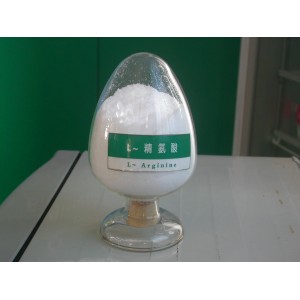Name L(+)-Arginine
Synonyms (S)-(+)-Arginine; 2-Amino-5-guanidinovaleric acid; 2-Amino-5-guanidinopentanoic acid
Molecular Formula C6H14N4O2
Molecular Weight 174.20
CAS Registry Number 74-79-3
EINECS 200-811-1
Assay:99.0%-100.0%
Characteristic:White crystalline powder
Solubility: Soluble in water.
L-arginine is used to make the nitric oxide, a compound in the body that relaxes blood vessels. L-arginine is also involved in protein formation. In the body, L-arginine is used to make nitric oxide, which reduces blood vessel stiffness, increases blood flow, and improves blood vessel function.
Function and Usage:
L-arginine is an amino acid that has numerous functions in the body.
Blood vessel function: In the body, L-arginine is used to make nitric oxide, which reduces blood vessel stiffness, increases blood flow, and improves blood vessel function.
Erectile Dysfunction: L-arginine has been used for erectile dysfunction. Like the drug sildenafil citrate (Viagra), L-arginine is thought to enhance the action of nitric oxide, which relaxes muscles surrounding blood vessels supplying the penis. As a result, blood vessels in the penis dilate, increasing blood flow, which helps maintain an erection.
Wound healing: L-arginine's possible activity in wound repair may be due to its role in the formation of L-proline, an important amino acid that is essential for the synthesis of collagen.
Other Conditions: L-arginine is also used for high blood pressure, migraines, sexual dysfunction in women, intermittent claudication, and interstitial cystitis.

 English
English 简体中文
简体中文


